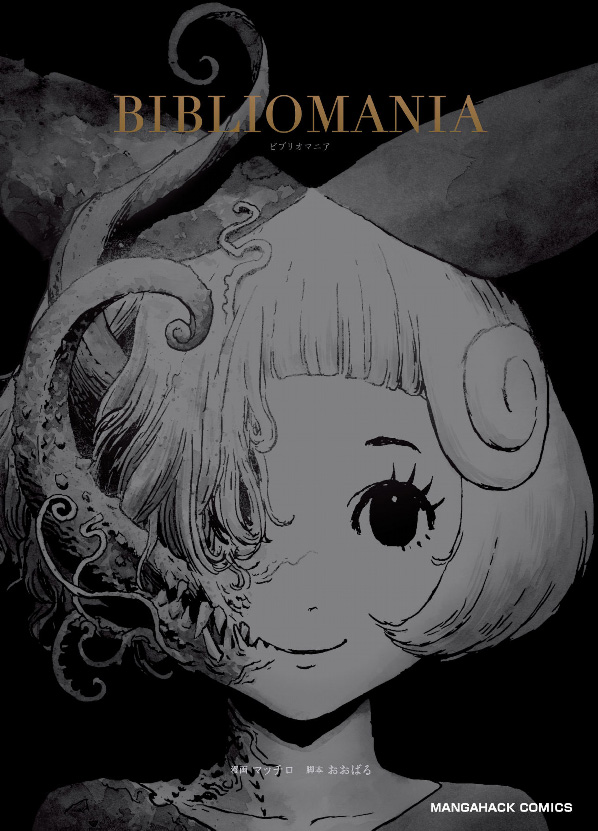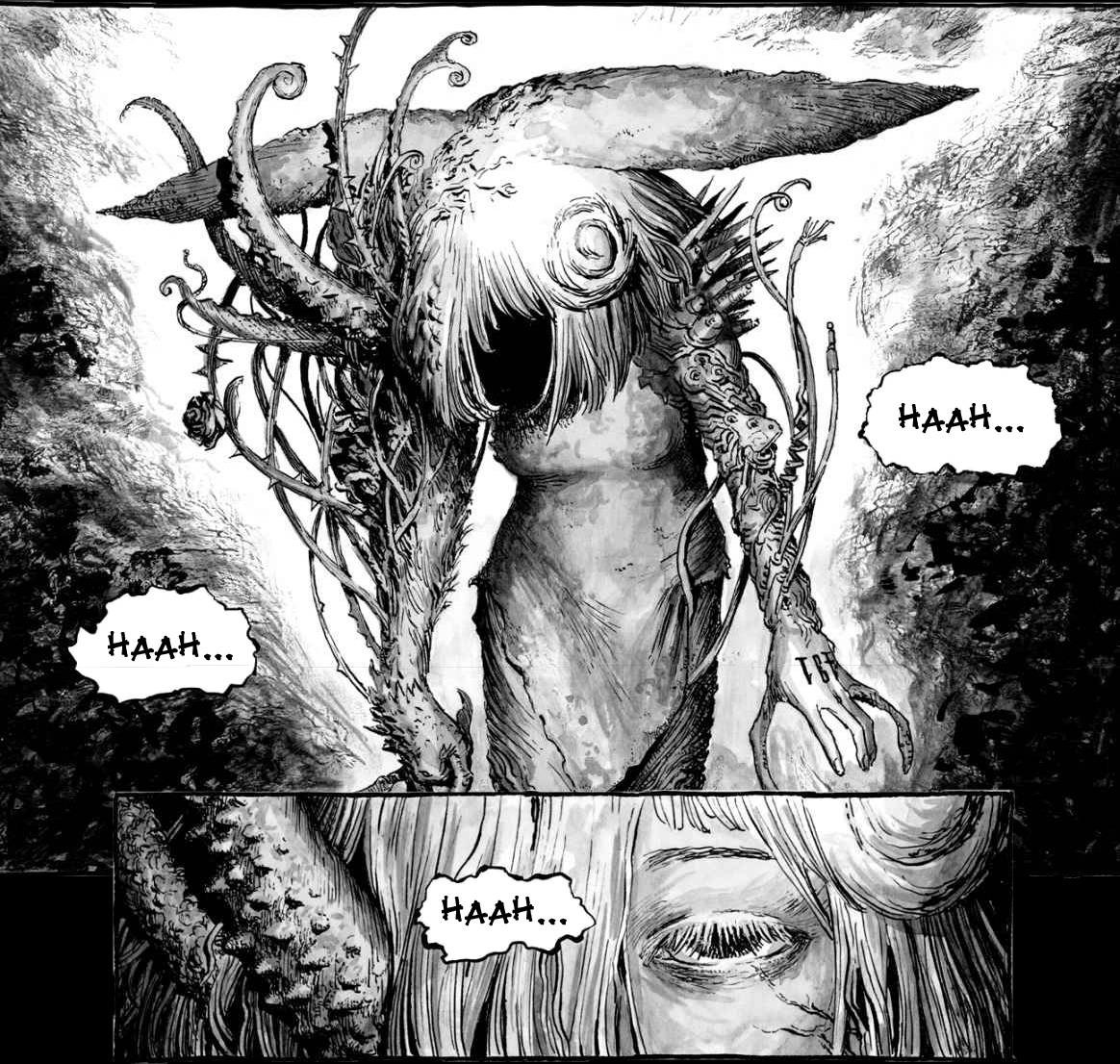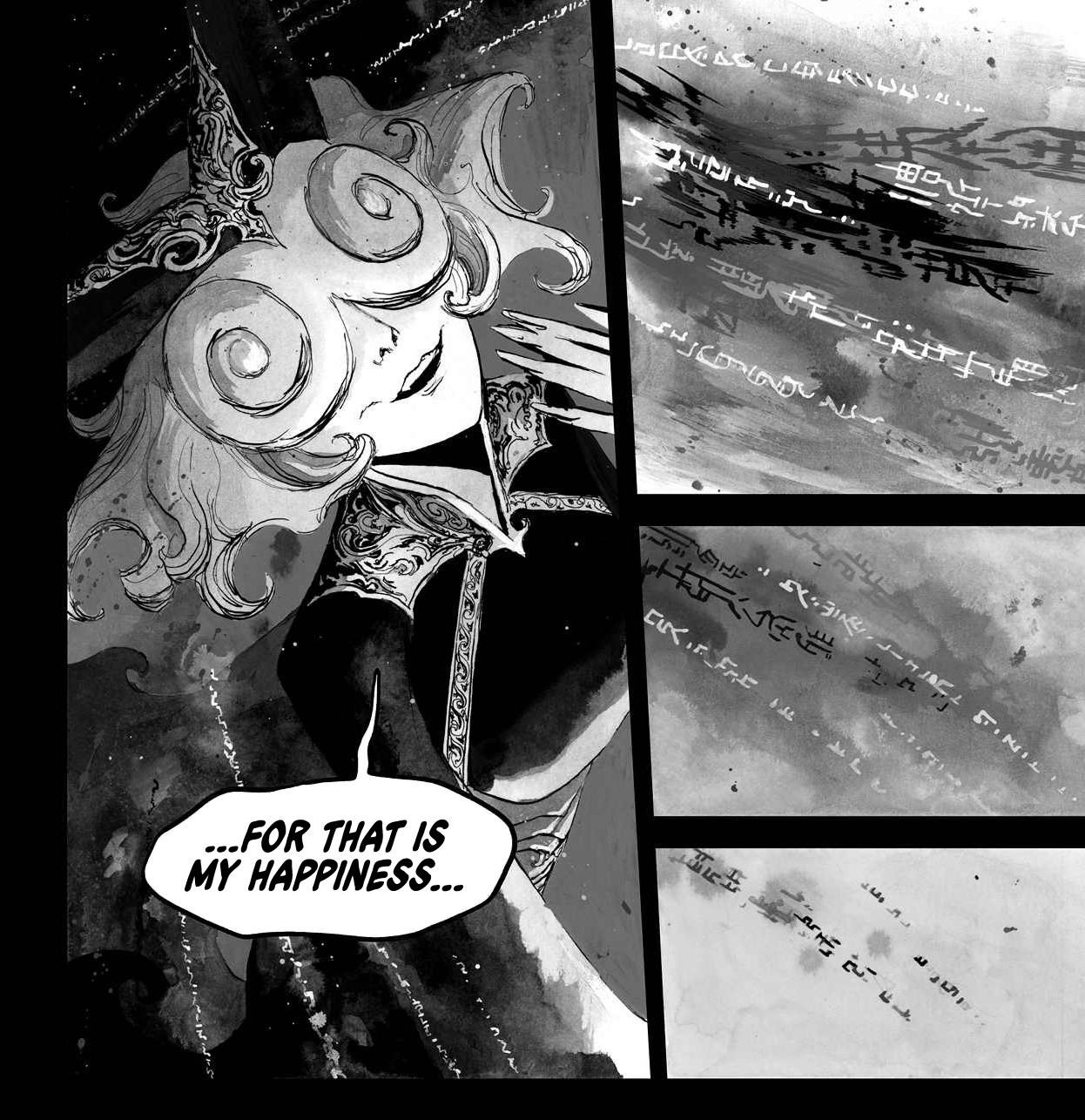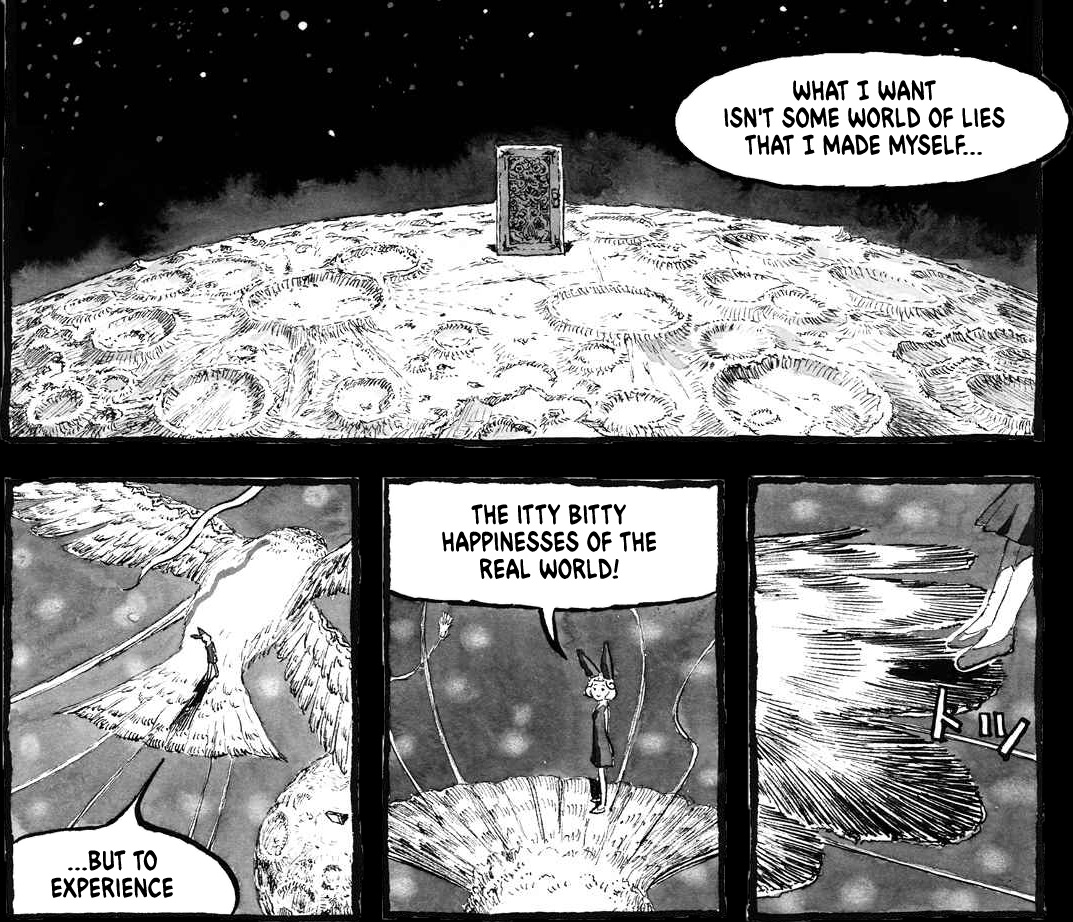

The relationship between humans and escapism is a popular theme in lots of media, and this is especially the case in more recent years. In many ways, people have shied away from solving any of our numerous worldly problems, because it's easier to create realities entirely separate that we trick our minds into diverting attention into. In many cases this is in the form of digital media, but for BIBLIOMANIA, storytelling becomes the primary means for absconsion.
Oxford Dictionary defines the word "bibliomania" as a "passionate enthusiasm for collecting and possessing books", which I find to be a humorously optimistic way to define a word that at first glance harbors a clearly negative connotation. The word "mania" breeds images of obsession - someone who cannot help themself from their own fixations.
BIBLIOMANIA is a manga was written by real-life friends under the pseudonyms "おおばる" (Oobaru) and "マッチロ" (Macchiro), and from what I can surmise through some tweets, was actually produced as a university graduation project around 2019-ish. It's really short, at only twelve chapters, and one could read it within an hour or so.
I first stumbled upon BIBLIOMANIA for the first time one afternoon during the summer of last year. I read through the manga in one sitting, reflected very briefly on what the message could have possibly meant, and then continued on with my day, making dinner and preparing for work the next morning.
And that night, I thought about it further.
And the next morning, as I was preparing to begin the day, I found myself mulling over it once again. The story had successfully managed to carve a space inside the recesses of my brain, where it would reside for some time, leaving months later at the absolute earliest.
Yet, this sensation was not foreign to me. When I first read Oshimi Shuzo's The Flowers of Evil, or the time I watched Yamamoto Eiichi's 1973 animated movie Belladonna of Sadness, the same recursions had struck me. Feelings that can best be described as the phenomenon in which a story has introduced themes that were so profound, that you feel as if you haven't and can never full comprehend their depth in their entirety.
The core premise of BIBLIOMANIA, is that it is an Alice in Wonderland -esque scenario in which the protagonist; a girl referred to as "Alice" (which is a trope that is way too on the nose for me whenever I encounter it in media) wakes up in a purgatory-like space. She is greeted by a Serpent, who tells her that she is the 431st guest to inhabit this place, and as long as she stays in her respective 431st room, anything she wishes for will come true.
The Serpent also explains that once the number of guests reaches 666 (again, way too on the nose, but it's fine), some sort of "party" will happen.
Alice is dissatisfied with waiting around, and wants to find the exit back into reality. The only exit is connected to the first room, Room 000, so she must pass through every room in between in order to escape.
However, the further she strays from her assigned room, the more her body is susceptible to rotting; depicted as growths of spores and hair that distort her body as she veers farther and farther from the starting point. The way Alice's body begins to turn more and more corrupted and beastly is very reminiscent of the manga and anime Made in Abyss, where characters' bodies become putrefied the farther they descend into the abyss.
With this being the initial premise for the manga (at least for the next few chapters to follow,) I don't necessarily care to detail every plot point in the story - it's too brief of a read for me to describe it so verbosely. I do, however, want to talk about why it stuck with me for so long after reading it initially.

To what extent can the "human experience" be minimally condensed? Consider every emotion a singular person encounters throughout the course of a life - every occurance of joy, moments of anger, bits of sadness. Feelings of pain, and desire, and loneliness, and hopelessness. Anger, euphoria, spite, misery.
The emotions experienced by a single person - however long their life becomes ultimately - is still so unimaginably complex that any attempt to record the firing of every neuron in the brain at any given moment would result in a document impossibly excessive in length and complexity. In this way, no human in history has ever had a biography successfully preserve their experiences during life in their entirety.
However, the fictional deities of BIBLIOMANIA offer humanity their own solution to this problem - allow themselves to be consumed, and the finality of death will, in turn, grant them a kind of immortality.
While having revealed this somewhat since the first chapter, Alice's journey, in actuality, takes place inside of a book, and the reality of the world is that it has fallen into ruin. At some point in this fictional timeline, humans successfully create a tome called "Book of Truth", which contains knowledge about everything in the world, and can convert the human form into a transcription of their memories and emotions, and stores that information in its pages. Copies of this book are made that - rather than focus on the preservation of information from the hosts they consume - are purely used for their destructive capabilities as a weapon of war.
For the innocent lives of people eaten in the manga that were diminshed into scraps of words, there was no choice given to them. But for us in reality, the story presents somewhat a question of ethics. How valuable is life versus the importance of preserving its memory?
Consider this thought experiment - would you rather die today, and have everything about yourself - both observed internally and externally, by others - archived permanently somewhere for the rest of time, or would you rather live much longer, and have nothing about yourself remembered following your death?
Personally, I feel like the easy answer is that most people would prefer to have a longer, more fruitful life along the spirals of the mortal coil. I somewhat agree with this sentiment, as for me, things only matter in life for as long as you are alive to experience them. But, I would like to play devil's advocate and consider that both answers to this question are valuable.
There is something very primal about wanting to collect data. Where I would imagine scholars in earlier eras would travel around and source information from universities or libraries, the Internet has somewhat streamlined this process for us (a massive understatement actually). Servers hosted across the world that backup data between each other, that are disseminated so quickly that its really difficult to make a definite measurement as to how many times a singular upload has been backed up, downloaded by multiple systems, or as to how definite the act of "deleting" something actually is once its entered the space.
The Internet is so broadly powerful that it borders on the limits of our own fathomability. And, generally, something that crosses into the medium, for as long as the concept exists, will remain there. If you die, things that you decided were significant enough to feed into the Internet will likely still be there, centuries after your body has given way to the Earth's soil. Any form of expression, whether that be writing, art, things you enjoyed, games you played, even dialogue between yourself and your friends and loved ones via instant messages, has been documented for the far future to reference.
It is often proposed that, if you and your work are remembered after your time during life has ended, then you haven't truly died. And in that way, even if that data stays dormant for potentially decades without a single person having even the smallest, most infinitesimal iota of consideration for what it is or why it's there or who put it there or how it reflects on its originator who conjured it up so long ago, it eventually will be the stone that gets overturned one day. The Internet is, in this way, the only current means we have of obtaining this semblance of proxy-immortality.

In reality, we have made our own "Book of Truth". It can preserve anything we want it to, and to some degree, it preserves even the things we don't necessarily want it to. It is preserved indiscriminately. It consumes in totality. To the Internet, this is its own bibliomania, and it cannot help itself but to feast.
While we don't necessarily sacrifice our mortality to upload bits of ourselves to this universal index (though, maybe there is argument to say that we do), one wonders, given the choice, what route is genuinely the correct to take. I think it's likely a very humanistic feeling to want to be remembered beyond your own conscious knowingness of it.
The concluding chapters of BIBLIOMANIA depict a clear biblio victory over the course of human civilization. Alice, who is revealed to be the Book of Truth, develops its own autonomous hunger to transcribe more lives, until it swallows the Serpent and the remainder of the entire world in a greedy onslaught. She then ponders about a new issue she has created for existence - now that she has added the existence of every living thing into her record, there is likely no-one left to read it. In the event that record outlasts the presence of life itself, does the record really exist at all if there is no one to process it? I think that there's a saying for this sort of paradox.
And well, yeah - there's probably something to be said there about how giving into desires is a cyclical habit, and how reasonless pursuit will spell the death of everything else. But, the reason why the narrative haunted me for so many months afterwards was in that it did not leave me with a clear message in which to interpret. Memory is powerfu. yes, and greed is all-encompassing. But what is the answer to these dilemmas?
It ultimately never provides us with a solution. In fact, maybe these sorts of things were never problems at all, in the literal sense. At some points, the story is just reflecting our behaviors back at us, with the mirror slightly skewed at a different angle.
One wonders about the writings of ancient philosophers and kings, and what sort of sacrifices were made in order to have their thoughts projected forward several millennia into the modern age. What part of their occupations was strictly motivated by this purpose, in fact? While surely not the damnation of the entire world, what sort of pain was inflicted onto themselves and onto others in order to make that a possibility?
In your own life, how much of your time will you sacrifice to pour into the preservation of your memory, after you're gone? And how deep does this need exist in you? Does it motivate you to create things? Does it drive you to engage in activities? Or to talk with others?
Perhaps then, we are all our own miniature versions of this Book of Truth, wherein we gather experiences, make them valuable, and then cast them into the much bigger, grander index that exists somewhere between the shared brain of our modern Internet, or something much more intangible. Subconscious, but somehow more enduring than a collection of several trillion hard drives scattered across a single planet.
Something that cannot be perceived by the senses, but maybe we somehow can still derive meaning from its pure, abstract, emanation of energy.
If anything I've discussed interests you even remotely, I urge you to seek out a means to read BIBLIOMANIA. Like I previously mentioned: while I did want to voice my thoughts on the story, I was more interested in sharing the thoughts that stewed in my head long after - seeds that were planted by its simple, yet open-ended tale.
Thanks for reading!
